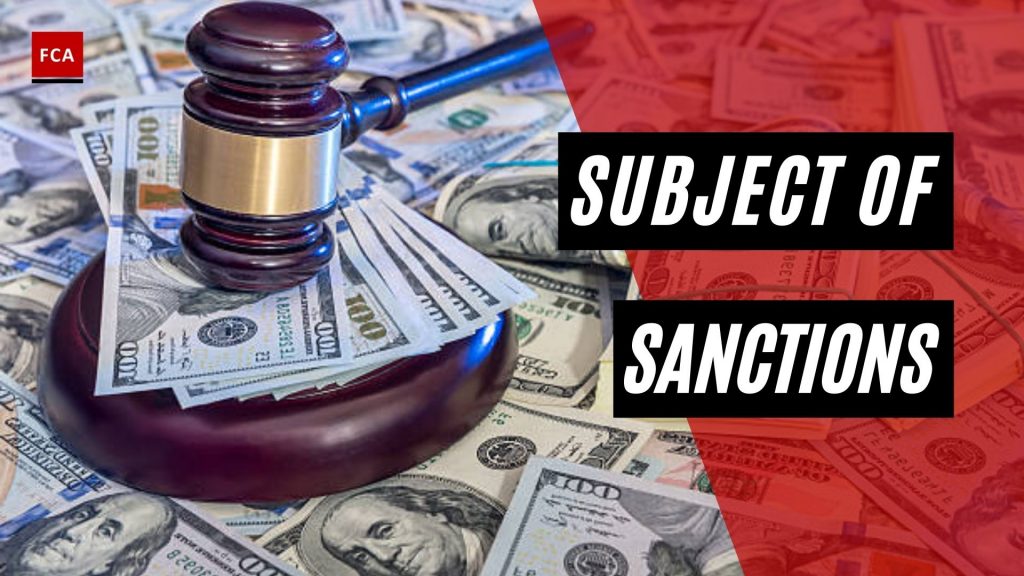Subject of sanctions. It might surprise you to learn that not only countries and organizations can become a subject of sanctions. Generally speaking, sanctions are applicable to everyone. While, for instance, an individual might not personally conduct due diligence of every vendor prior to buying a cup of coffee in order to determine whether it is sanctioned, the buyer could be held liable, for example, if the beans were sourced from Iran, however unlikely.

Subject Of Sanctions
Complying with sanctions requires using a risk-based approach. Even though guidance is provided on how best to comply with sanctions, it is not expected that the average citizen will have a personal, fully formed sanctions compliance program.
Additionally, sanctions are a matter of jurisdiction. Citizens of a country, and ins some countries permanent residents as well, must comply with sanctions regardless of whether they are outside of their home country. This is true for the US, EU, and most other autonomous sanctions. If a person is on vacation overseas, their country’s sanctions laws still apply. Conversely, any individual, regardless of citizenship, must comply with the sanctions law of any country they are in physically.
United States
Now in the United States, there is a wide array of requirements to determine who is where subject to sanction. Probably the most important of these requirements is that US citizens and permanent residents wherever located are subject to US sanctions.
The same applies to companies and other entities organized under US law, to all people and organizations, whatever their origin, physically in the United States, and to all branches of US companies and other entities throughout the world. This means that a US company might not violate US sanctions in their non-US branch.
European Union
Now for the European Union, the sanctions it imposes will apply only where links to the EU are present. In particular, sanctions apply within the territory of the European Union, on board any aircraft or any vessel under the jurisdiction of a Member State, to any person inside or outside the territory of the European Union, to any legal person, entity or body, inside or outside the territory of the European Union, which is incorporated or constituted under the law of a Member State, and, finally, to any legal person, entity or body in respect of any business done in whole or in part within the European Union.
In the US, legal entities organized under US law and their foreign branches must comply with US sanctions. The same holds true for legal entities and their branches that are organized under the laws of an EU jurisdiction. For example, UK legal entities established under UK law, including their branches, must also comply with UK financial sanctions in force, irrespective of where their activities take place.
EU Sanctions
However, under the EU sanctions, a company’s subsidiaries located and doing business outside of the EU are not subject to EU sanctions unless the parent company exercises meaningful control of the operations. This does not apply to branches of EU companies, as branches are not distinct legal entities.
But if sanctions regimes do not necessarily have prescriptive rules that must be followed regardless of the potential for a violation to occur, such as a legal requirement to collect identifying information on a customer, then why do financial institutions spend so much money on these programs? The answer is that domestically, governments regulate compliance with sanctions through penalties, including fines and imprisonment.
In this respect, there may not be much difference between the coffee shop at the exit of the subway and the large financial institution at which compliance professionals work. Both are subject to the same fines and penalties that may result from a sanctions breach. However, because the cost of a cup of coffee is 3 Euro and its sale to a sanctioned target would have little impact on undermining the purpose of a sanctions regime compared to the remittance of a 50,000 Euro wire to a sanctioned target in a sanctioned country, some industries, like financial institutions, should have robust sanctions compliance programs.
Financial Institutions
Given the large exposure financial institutions may have to potential sanctions violations and the large fines that may occur, financial institutions may be regulated for sanctions compliance as a matter of safety and soundness to their financial health. The US is a well-known example of this. The US enforces sanctions compliance programs on regulated institutions as a matter of safety and soundness. This means that sanctions violations may result in penalties so large that the safety and soundness of the financial institution are placed in jeopardy.
Final Thoughts
When doing business internationally, the last thing you need are costly sanctions violations. It’s critical to have a robust sanctions compliance program in place, including national and international screening and monitoring, to help protect your company from doing business with sanctioned entities. This entails running specialized searches through global, government, and regulatory databases to find entities that are prohibited from participating in certain activities or industries.








